It's an apt time to praise Eintracht Frankfurt, days after die Adler trounced the mighty Bayern, ending a 16-game winless streak and former SGE coach Niko Kovač’s tenure in one fell, 5-1, swoop.
In all honesty, we should have known better, or at least I should have.
Regretfully, I picked SGE to fight against relegation last season — on the back of losing to 4th-tier SSV Ulm in the first round of the cup and the 5-0 evisceration by Bayern in the Supercup. I shared others' concerns about new coach Adi Hütter, who wanted to play the RB school’s 4-4-2 without wide players, and only later switched of 3-5-2 when he realized he would have to reinvent the careers of Danny da Costa and Filip Kostić. So, this prediction was perhaps not as crazy as the results suggested — but at least I didn't say it aloud during my first-ever analyst appearance on TV or anything...
My prediction was doubly painful having followed and covered Eintracht’s long-awaited rise from being “the moody diva” of the Bundesliga to European relevance. Under the stewardship of Peter Fischer, who frequently speaks out against and bans AfD voters from being Eintracht members plus buys fans beer at matches, Eintracht have reinvigorated their football club into a passionate, multicultural project that Frankfurters can be proud of.
On the footballing side, board member Fredi Bobic’s wheeler-dealer attitude, aided by a smart scouting network coordinated by chief scout Ben Manga, has rescued many wayward talents from big clubs in need of playing time (Ante Rebić, Marius Wolf, Omar Mascarell, Jesús Vallejo, Evan N'Dicka) and scouted young gems from lesser-known leagues (Luka Jović, Mijat Gaćinović, Sébastien Haller, Daichi Kamada). They also turned veteran cast-offs like Kevin-Prince Boateng, Sebastian Rode, Gelson Fernandes and Jonathan de Guzmán into competitors.
The Buffalo Herd has become the Portuguese Pack
Despite their success last season, few (including myself once again) thought that after profiting 100 million Euros from the Jović and Haller departures and losing Rebić, Eintracht would somehow emerge as an even better side! But that seems to be exactly what happened, as the combined 10 million spent on Porto’s Gonçalo Paciência (who put up some good numbers off the bench last season), and Bas Dost of Sporting, as well as swapping Ante Rebić for AC Milan's André Silva, has led to, if not an actual increase in production, certainly no drop-off.
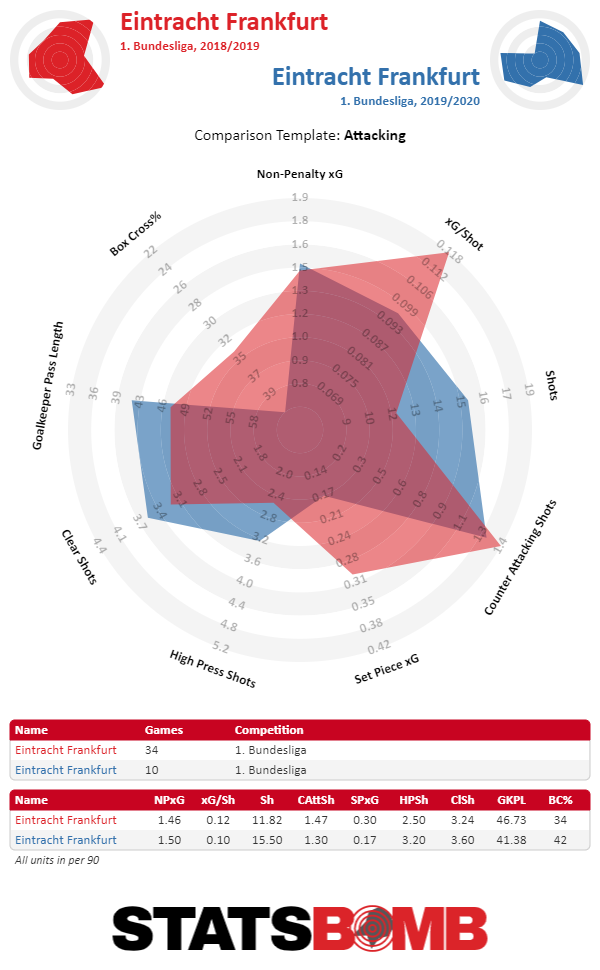
Frankfurt have accumulated 1.50 non-penalty expected goals per match and conceded 1.31 xG against vs 1.46 and 1.43 numbers last season. So, while they are once again on 17 points from ten games this season, they have an improved xG difference of 0.19, up from 0.03 over the course of last year. The Eagles have already faced the top five sides by xG difference.
With their next two opponents, Freiburg and Wolfsburg, coming back down to Earth, followed by three against bottom-dwellers Mainz, Cologne and Paderborn, don’t be surprised if Paciência and Co. are in the Champions League spots in January. On an individual level, last season’s 41 goals by Jović-Haller-Rebić (the "buffalo herd," as they were affectionately known) is the same pace that Paciência-Dost-Silva are on, with 12 in 10 games.
The other remarkable thing is that with 1.47 non-penalty xG per 90 minutes, the Portuguese Pack is bringing a better return than the 1.3 of Jović and his partners. Paciência, in particular, has really come into his own. He's not only a goal scorer but an increasingly well-rounded striker, contributing to all facets of Frankfurt's game.
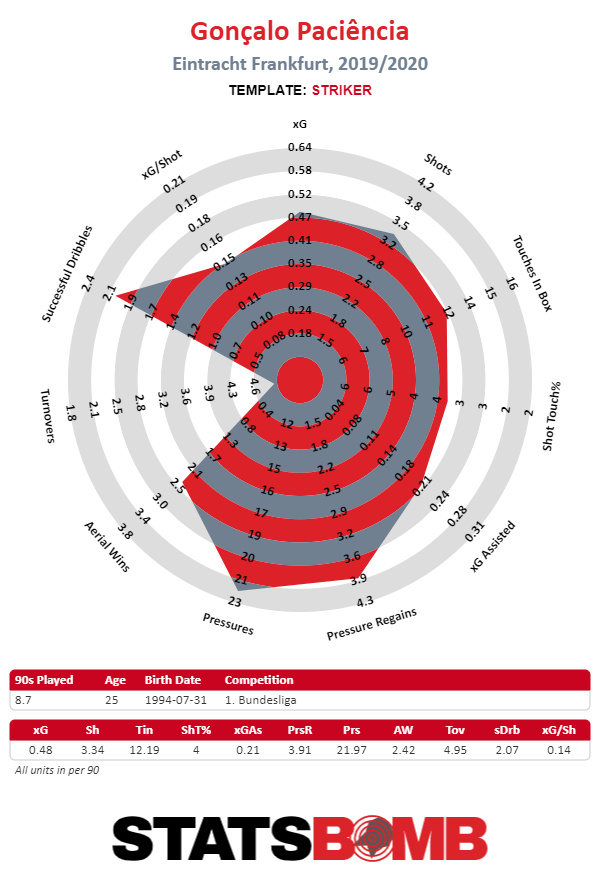
Crossing their way forward
Eintracht's improvement is impressive. Throughout his time in Austria and Switzerland, Hütter’s teams shunned possession and instead relied on vertical ball progression and counterpressing to create attacks. Unlike last season, Frankfurt almost never play three strikers at the same time (though it’s easy to forget that Hütter didn't install Rebić behind Haller and Jović until early November). Instead, behind the front two of Paciência and either Dost or Silva, Frankfurt play the creative Daichi Kamada, who remains scoreless despite averaging almost 0.3 xG per 90.
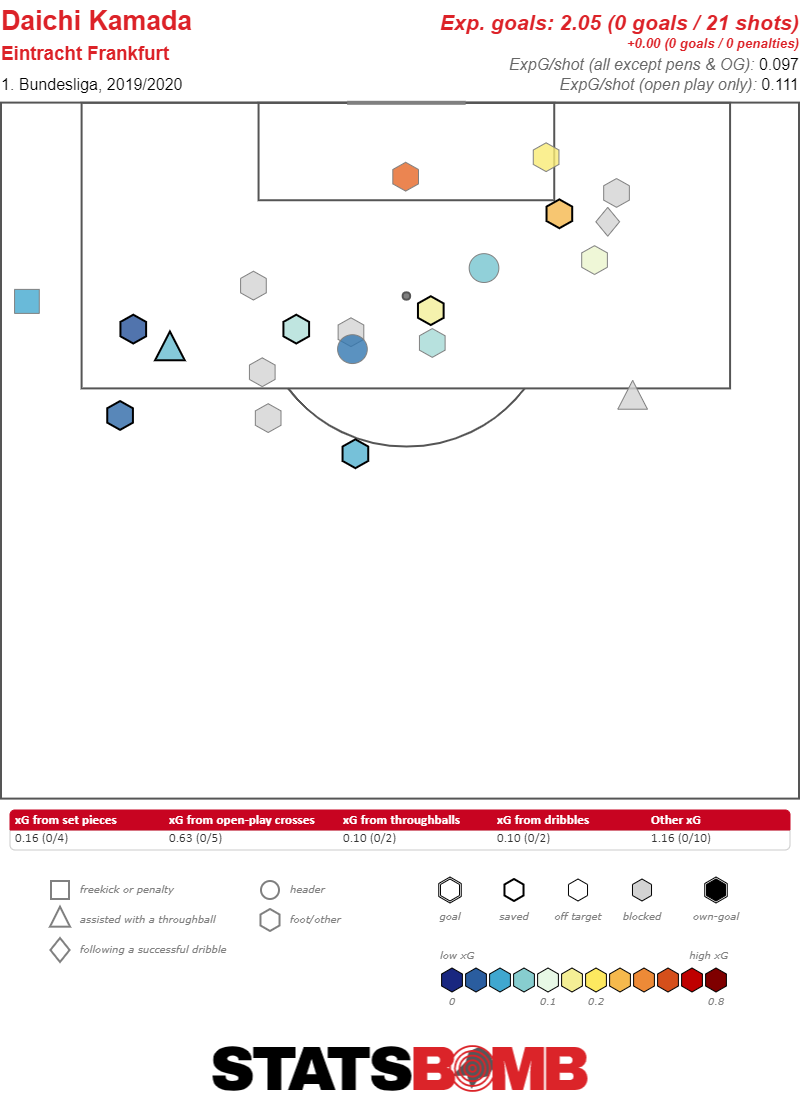
The 23-year-old, signed for 1.6 million from the J-Leauge's Sagan Tosu, scored 12 goals while on loan with Sint-Truiden in Belgium last year, is a Hütter favorite, especially after tearing up the preseason. He flashes on tape for his ability to create space and chances for himself, and though Kamada has to improve his finishing and should consider better shot selection, it seems like Eintracht got themselves another potentially useful creator.
Although he does not have the defensive pressing skills of Rebić, Jović lacked this as well, so perhaps it all evens out.
And despite losing Jović and Haller, they once again are the most cross-reliant team in the Bundesliga.
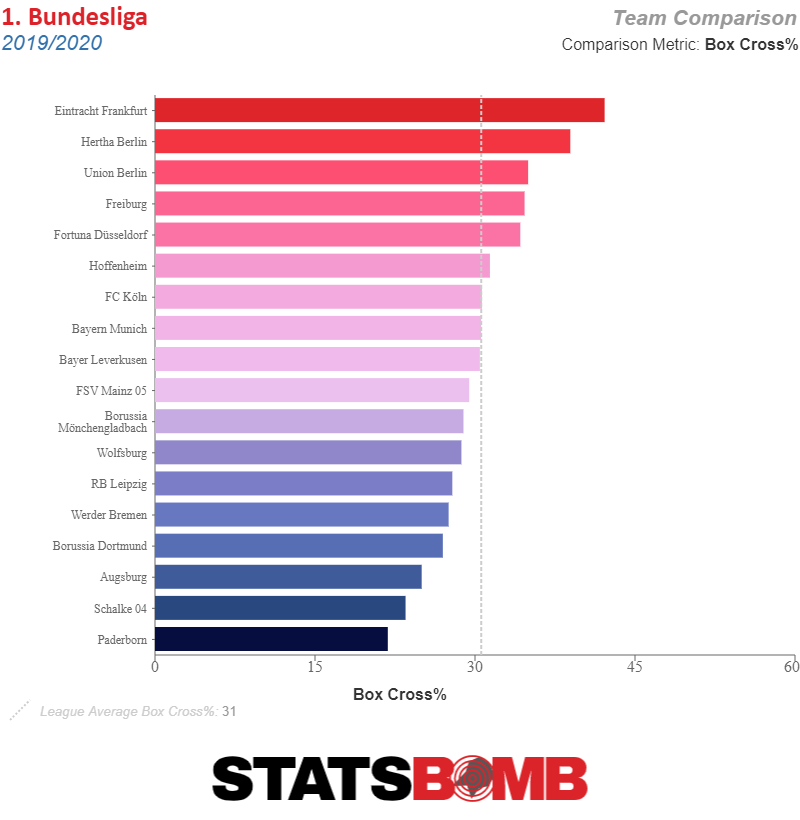
Bas Dost, despite his somewhat limited Bundesliga minutes, remains an absolute monster in the air. His 8.48 aerial wins per 90 are 1.5 more than any other attacker who's played over 300 minutes, and his 66% win percentage on aerial duels also leads all strikers in the German first division. Dost, especially if he plays more regularly, should be an apt replacement for Haller, the most prolific attacking aerial battler in last year's Bundesliga in that regard.
The challenge of crossing, of course, is that it's inherently inefficient and lots of balls into the box will amount to nothing. There's no greater example of this challenge than Filip Kostić. Hütter has converted the Serbian from a left winger into the league’s preeminent attacking wing back. The 27-year-old is an absolute crossing machine, but as you can see from all that yellow, most crossing machines, even the best ones, misfire a lot.
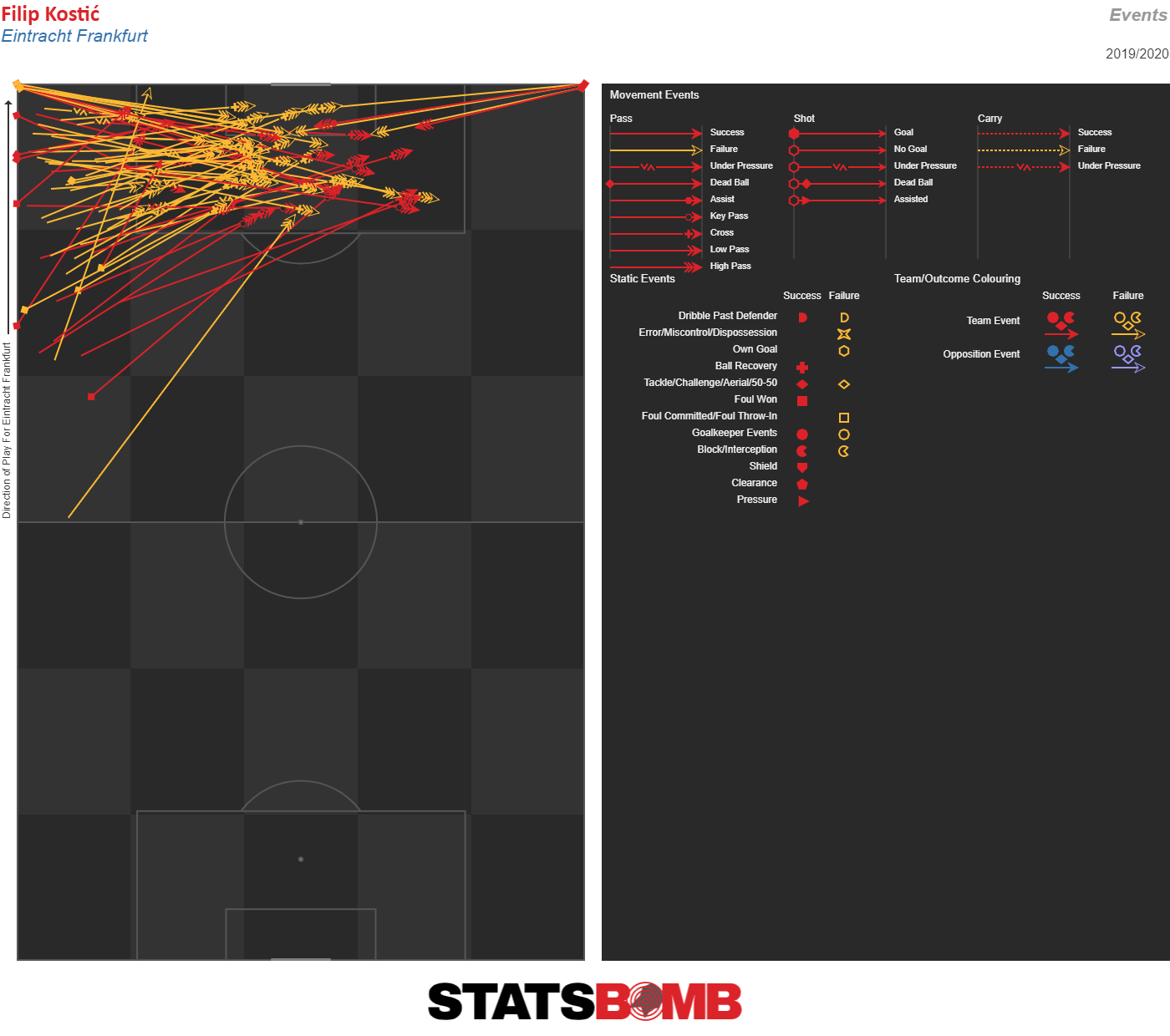
Never one to tire out, Kostić is also putting up a career-high 3.6 shots per 90, breaking an 0 for 27 start with a tap-in after a deflection off David Alaba in the 5-1 rout over Bayern. Congrats on upgrading your xG per shot to 0.07, Filip.
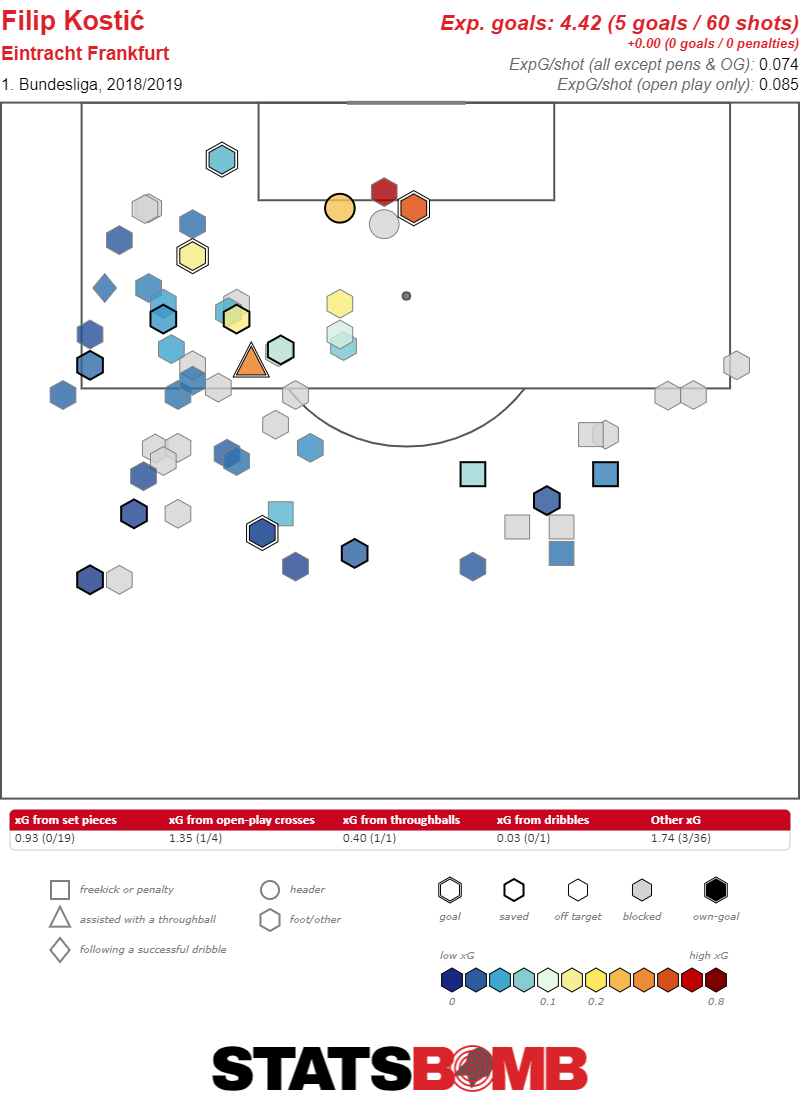
Aggression and Depth
While crosses may not be efficient, pile enough of them on top of each other and a team can generate a pretty effective attack. They also allow a side to have the spacing it needs to initiate an aggressive press on the defensive side of the ball. Hütter has dialed up Eintracht's already above-average pressing. Their passes allowed per defensive action is down from 10.58 to 9.04 and Kostić’s left side seems even more aggressive this season. The average distance from their own goal to where they perform a defensive action has also increased, jumping from 43.96 to a league-best 47.71 this season.
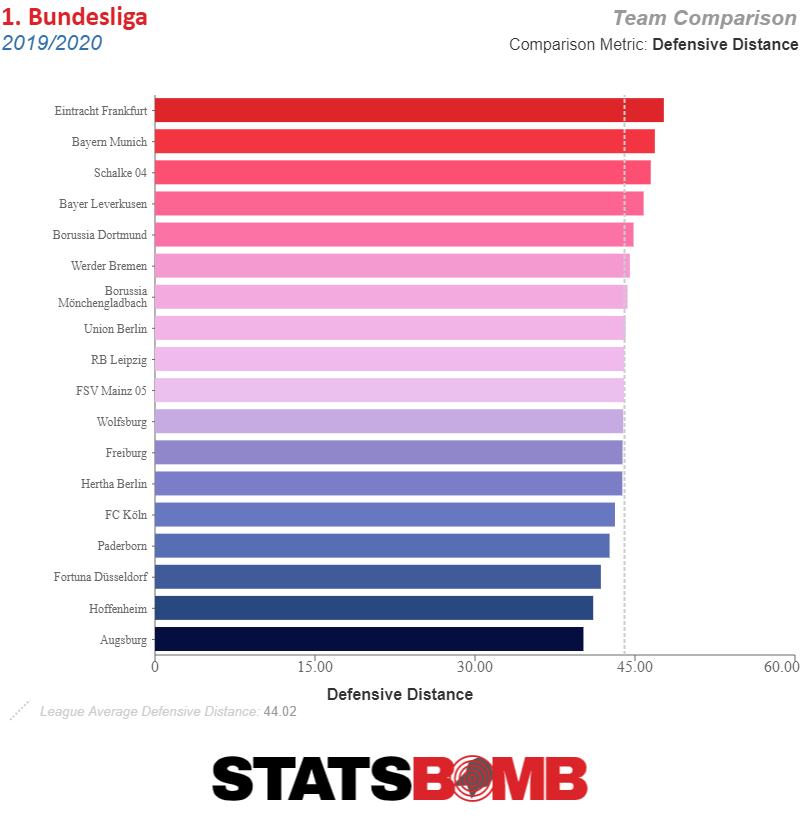
Given the side's depth, Hütter can ramp up his already aggressive system. Last season, Frankfurt began showing signs of setting up in an intriguing three center back format.
Instead of playing three narrow defenders and urging the wing backs to come in deep to receive the ball (they only really do this when defending in a deep block), Hütter used Kostić and da Costa up as wingers last season. What's most significant is how they set up centrally and wide. Their defensive midfielders drop deep to aid ball circulation (in a five-minute spell in the first half against Bayern, all three — Djibril Sow, Sebastian Rode and Gelson Fernandes — did this), create numerical superiority and secure the middle against potential counterattacks.
This allows their wide center backs to press high near the opponent's box. In addition, they are instrumental in their ball progression via long diagonal balls to the central strikers dropping between the defense and midfield. The importance of diagonal balls, as RB Leipzig manager Julian Nagelsmann often likes to say, is that they are much harder to intercept, and the better angle gives an easier chance of completion.
The central center back is also tasked with dribbling up the pitch when given the opportunity. Last season that onus fell on 35-year-old Makoto Hasebe, who played like a modern-day libero and was considered by kicker to be one of the top CBs in the fall season. As his age and injuries have caught up to him, he’s made defensive mistakes (conceding a needless 90th-minute penalty vs. Bremen, for one), allowing Martin Hinteregger to move inside.
The 27-year-old Austrian has always been one of the more colorful Bundesliga characters:
-
- While still an RB Salzburg player, lashed out against another Red Bull club, Leipzig, thus forcing a move to Augsburg.
- He hanged his smartphone to a flip phone after he got fed up with Augsburg coach Manuel Baum sending him and his other players tactical videos on Whatsapp
- During an interview, he famously “couldn’t say anything positive about Baum.”
- Shortly after, he asked to be released in a drunken training camp video
- He was dismissed from the Austrian national team after staying out until 7am celebrating his 27th birthday during the Euro qualifiers
- And he ecome a folk hero and the star of the legendary “Hinti Army” video Yes, it’s a joke poking fun at Status Quo’s 1986 hit.)
On the other hand, Hinteregger can carry the ball out of defense like this:
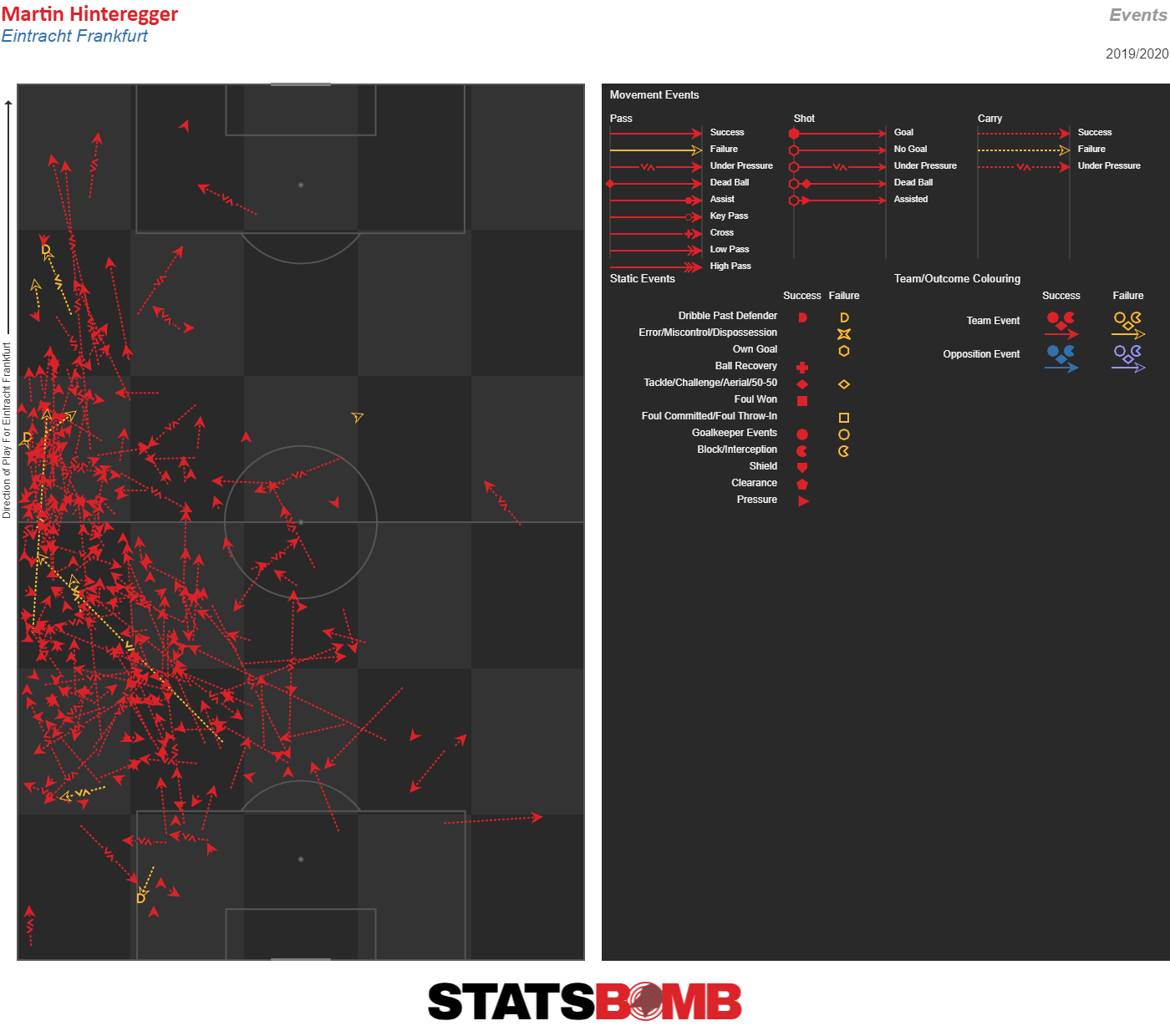
Hinteregger, who has already scored three goals this year, is among the best Bundesliga defenders. Due to the risks Frankfurt take with their aggression and high counterpressing, they can get caught in the extreme three attackers against three wide center backs defensive system. This might result in slightly more clear shots and higher per match xG conceded, but so far the xG remains low enough, and the team's actual goals conceded remains in line with expectations.
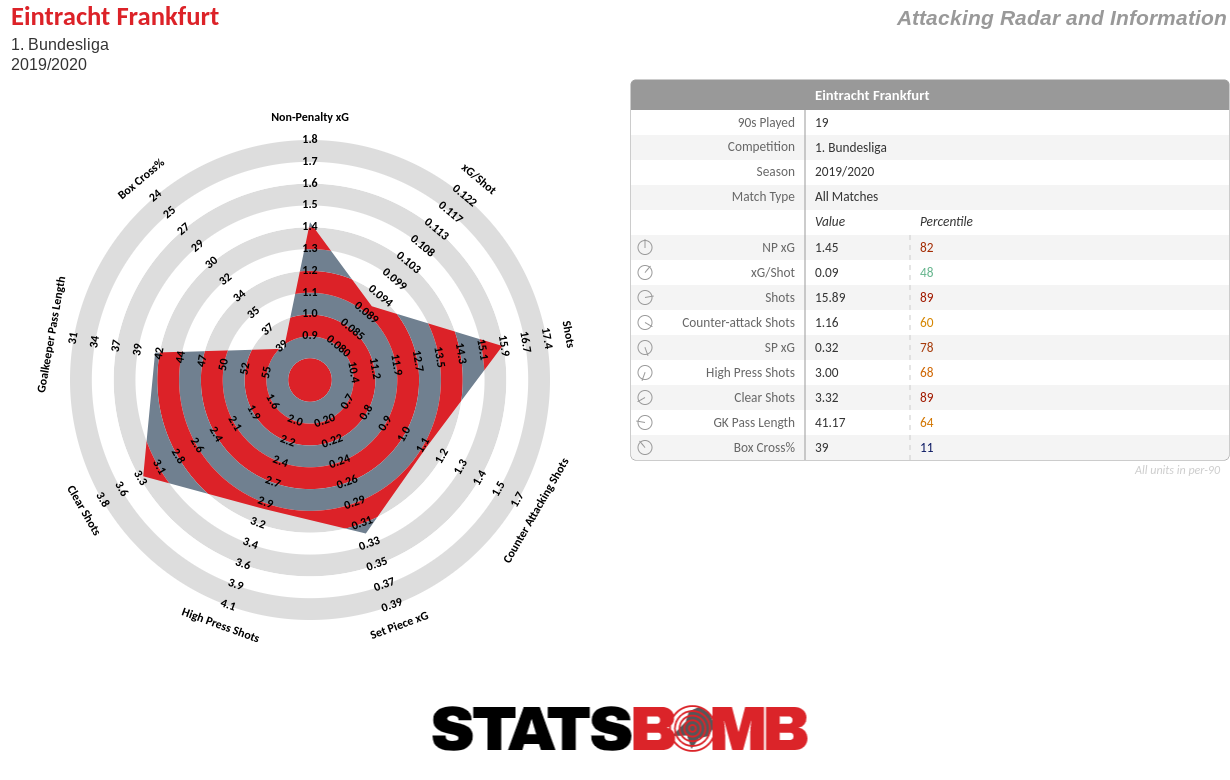
Put these numbers together and it's obvious Frankfurt are an extremely well-managed side. Adi Hütter is now averaging 1.8 points in 71 matches, on a contract that runs until 2021. Though there's been no news out of Frankfurt regarding his future, if Niko Kovač's career and the last they years of Eintracht’s excellent operation is any indication, they might not be able to hold on to him for much longer. Of course, they’re probably just gonna pull another great coach out of that scouting folder….